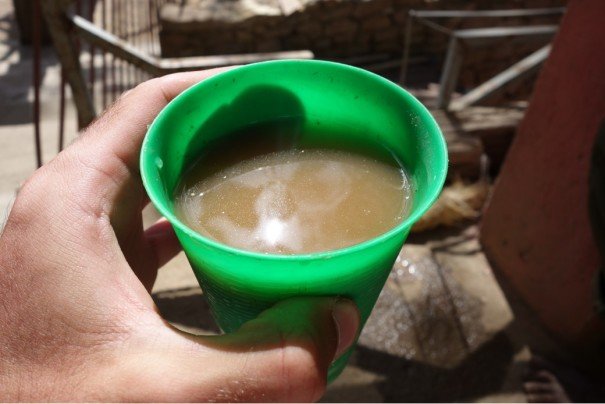
Drinking Home Brew With a Kalashnikov‑Wielding Monk

Drinking Home Brew With a Kalashnikov‑Wielding Monk
Tella at Debre Damo
It’s said that when Abuna Aregawi, one of the nine Syrian saints who introduced Christianity to Ethiopia, set out to establish a monastery atop Debre Damo, a serpent descended to pull him up under the guidance of angels. Nowadays, the 6th-century monastery remains upon the flat-topped mountain; the snake, however, does not. In its place is a tattered leather rope, the sole connection between the all-male residents and the outside world.
Hiking up to the base of the mountain, I’m anxious for the sun to set. While any respite from the heat is welcome, transport stops after dark so I best be quick if I want to make it to the next town.
The monks on the ground nonchalantly wrap the rope around my waist and before I know it the monk at the top is pulling me up the 50-foot cliff. The smoothness of the rock means I’m not really climbing up, but rather being pulled, yet somehow I’m still exhausted at the top. Heat, heights, and exercise tend not to go well on an empty stomach.
As if by yet another act of divine intervention, two elderly monks wave me over to another cliff to eat dried chickpeas. The individual beans are as hard as rocks, yet the toothless monks devour them. It’s at this point that I’m reminded the clergy tend not to speak any English, though perhaps it was my Tigrinya which was lacking. As we sit, we smile and grunt and exchange what is effectively gibberish with one another over handfuls of chickpeas. The atmosphere is serene: no cars, no music playing, and no one speaking loudly. We wait as the sun starts to move lower.
After a while, another monk calls out and my two new friends beckon further up the mountain towards the monastery itself. As I wander through the gate, a man sitting on the veranda of one of the newer additions to the complex calls out to me. Same story: no English, no Tigrinya. This time legumes aren’t what’s on offer, but rather a suspicious-looking jug. And unlike the priestly robes of the other two monks, my new friend wears camo and has an AK-47 slung over his shoulder.
This friend takes a large green cup and rinses it with murky-looking water from another jug. He then fills it to the top with a mysterious, opaque liquid with specks floating across the surface. With my friend watching eagerly for my reaction, I take a sip. Similar to white wine, except warmer, and with bits in it. It’s only days later that I discover that what I’ve been drinking is Tella, a traditional beer brewed from teff, a grain omnipresent in Ethiopian cuisine.
Three cups later and I’m full. My friend doesn’t notice, looking as if he’s been sipping away all day long. We gaze out across the complex, off the cliff and into the fading mountains. It’s not every day you get to drink a traditional homebrewed beer with a Kalashnikov-wielding monk at a 6th-century monastery atop a mountain in the middle of nowhere. We watch as the earliest signs of shadows began to form, exchanging finger points, grunts, and countless laughs. It was almost enough to make me forget that I still had to go back down.